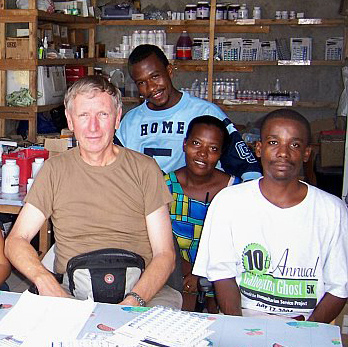| |
 |
|
|
|
|
| |
CC pharmacist Dr. Frank Nice (l) prepares to fill prescriptions in a pharmacy in Haiti with Haitian pharmacists, technicians and nurses. |
|
Clinical Center inpatient pharmacist Dr. Frank Nice, on the birthday of Dr. Martin Luther King, Jr., was awarded the President’s Call to Service
Lifetime Award for his volunteer humanitarian
work in Haiti. The award, presented at HHS headquarters, cites Nice’s “commitment to strengthening his community and the nation through dedicated volunteer service.”
Nice completed his 10th medical mission to Léon, Haiti, last October. Many of the 50,000 Haitians who live there had never seen a doctor
or pharmacist before he arrived. Due to the prevalence of death from curable diseases and birth deformities, the average Haitian lifespan is slightly more than 50 years; many children do not live more than 5 years.
Nice first traveled to the region 12 years ago through a program that paired his church with a community in Léon. He had just emerged from some personal financial difficulties that gave him a new appreciation for others in need. “I thought my talents as a pharmacist were a means to a comfortable lifestyle. Later I realized I was given those talents so I could use them to help people. I went from having nothing myself to being able to give to others,” he said.
As a result of his efforts, two or more teams travel there every February, June and October.
They treat about 10,000 patients and fill more than 40,000 prescriptions each year, all with medications and supplies purchased with donations. Each team checks 1 ton of supplies as baggage and team members live out of what they can carry onto the plane. “Seeing about a dozen people each trip who would have died without an intervention, you become very humbled,” he said.
By concentrating their efforts on one town, Nice and his fellow volunteers were able to
CC pharmacist Dr. Frank Nice (l) prepares to fill prescriptions in a pharmacy in Haiti with Haitian pharmacists, technicians and nurses.make and witness large changes. Although it took nearly a decade, the region’s citizens can now receive health care and education with dignity and respect. Nice purchased land and built a school for orphaned, destitute children and volunteers
built a second school. Volunteers also repaired the medical clinic building, replaced infected river water with running mountain spring water and started vaccination and tuberculosis treatment programs.
After seeing the lack of health-care infrastructure in Haiti, Nice appreciates the resources he has to work with at NIH. For example, Haitian patients must secure all their medications and supplies for a surgery from free clinics and bring them to those who will provide the care. He has known of very ill grandmothers who walk 24 hours over mountain passes to reach a clinic. “Our complaints are made out of our excesses,” he said. “Theirs are made out of their needs. But people will deal with a tremendous amount of pain if they have hope that something might help their condition.”
Nice can recount several success stories from the clinic, but it is the people they could not help who haunt him. Sometimes the group can only provide palliative
care, knowing that if the condition had been treated earlier, a life might have been saved.
“In the U.S., people can choose to postpone seeing a doctor. In Haiti, they don’t have a choice. People walk around with treatable diseases until they either get better
or die,” he said.
Despite political upheaval and customs hassles, Nice said he will return to Haiti every year to volunteer for the rest of his life. The eyes of the people who walk into the pharmacy and clinic keep him coming back. According to Nice, “those eyes pierce your heart and penetrate your soul. No matter what condition the person has, it’s like they’re saying, ‘You are my only hope. If you don’t help me, no one will help me.’ I can’t stop from going back to look into those eyes.” 